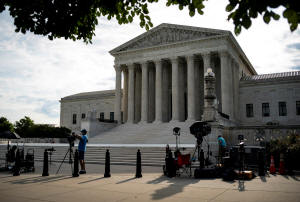U.S. Supreme Court again tackles public funding for religious schools
 Send a link to a friend
Send a link to a friend
 [December 08, 2021]
By Andrew Chung [December 08, 2021]
By Andrew Chung
(Reuters) - The U.S. Supreme Court on
Wednesday is set to hear a challenge by two Christian families to a
Maine tuition assistance program that excludes private schools that
promote religious beliefs, giving its conservative justices a chance to
further expand public funding of religiously based entities.
The nine justices will hear an appeal by the families of a lower court
ruling rejecting their claim that the Maine program singles them out for
religious discrimination in violation of the U.S. Constitution including
its First Amendment protection of the free exercise of religion.
The families want taxpayer dollars to send their children to two
Christian schools that integrate religion into their classrooms and have
policies against gay and transgender students and staff. The First
Amendment also prohibits government endorsement of any particular
religion.
The case comes to the Supreme Court on the heels of its 2020 ruling in a
case from Montana that paved the way for more taxpayer dollars to flow
to religious schools.
The eventual ruling in the Maine case could further erode the separation
of church and state in the United States. Expanding religious rights has
been a priority in recent years for the court, which has a 6-3
conservative majority.

The Montana ruling, which involved an educational tax credit, prevented
states from disqualifying schools from public aid based on their
religious status or affiliation. The Maine case goes further, with the
possibility looming of requiring states that subsidize private education
to also fund religious activities.
Maine is backed in the case by President Joe Biden's administration,
public school boards and teacher unions. The state has said it excludes
certain private schools not because they are religious but because they
would use public funds to promote religious beliefs.
The families contend that restricting taxpayer dollars from being used
for religious purposes is discriminatory. They asked the justices to
consider overruling a 2004 Supreme Court precedent in a case called
Locke v. Davey that upheld a Washington state post-secondary grant
program that excluded theology students.
[to top of second column]
|

Members of the media set up in front of the U.S. Supreme Court
building in Washington, U.S., June 25, 2020. REUTERS/Al Drago

In some sparsely populated areas that lack public secondary schools,
Maine lets public funds be used to pay for tuition at certain
private schools of a family's choice. The schools must be
"nonsectarian" and are excluded only if they promote a particular
religion and present material "through the lens of that faith."
Two sets of parents - David and Amy Carson, and Troy and Angela
Nelson - sued the state in 2018 in federal court.
The Nelsons would like to use the tuition aid to send their son to a
Christian school called Temple Academy in Waterville, but instead
use it to send him to a secular private high school. The Carsons
paid out-of-pocket to send their daughter to Bangor Christian
Schools in Maine's third-largest city.
Both of the schools involved are private and fully accredited
schools. They describe themselves as seeking to instill a "Biblical
worldview" in students, according to court records. They will not
admit gay or transgender students, or hire gay teachers. Bangor
Christian Schools also teaches that a "husband is the leader of the
household" and includes a class in which students learn to "refute
the teachings of the Islamic religion with the truth of God's Word."
The Boston-based 1st U.S. Circuit Court of Appeals ruled against the
families last year, deciding that Supreme Court precedents do not
forbid states from barring public funds from religious entities
based on how those dollars would be used.
(Reporting by Andrew Chung in New York; Editing by Will Dunham)
[© 2021 Thomson Reuters. All rights
reserved.] Copyright 2021 Reuters. All rights reserved. This material may not be published,
broadcast, rewritten or redistributed.
Thompson Reuters is solely responsible for this content.
 |